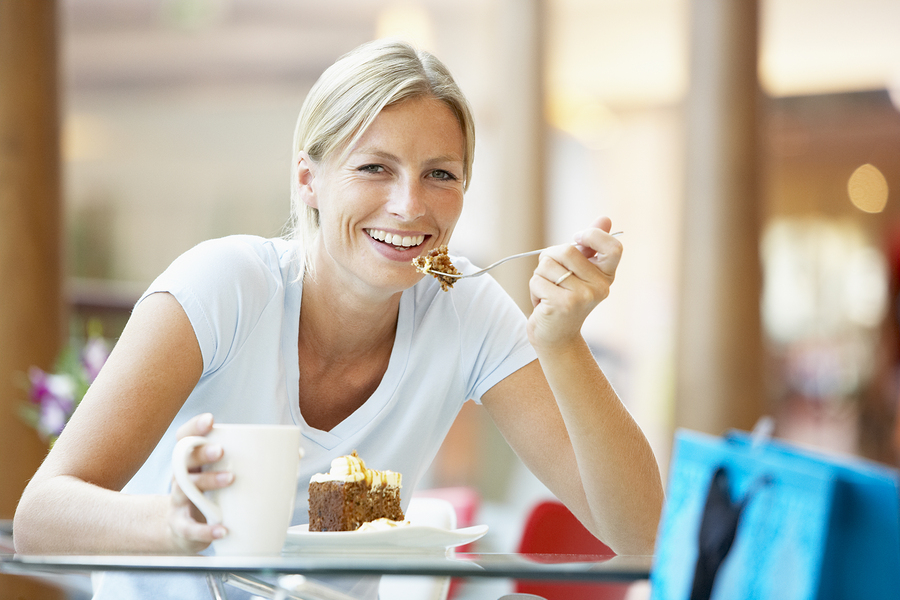Anti-diets – an intuitive way to eat
Find out more about the 10 principles of intuitive eating
Many of us struggle with shifting unwanted pounds and with over two thirds of UK women on a diet at any one time the struggle is very real.
Obesity figures are rising and both men and women are encouraged to improve their health by looking at what they eat; but two thirds of women are not medically obese – so why do we feel the need to follow a diet?
Advice on what we should be eating seems to shift like the wind leaving us confused and overwhelmed with yet another fad diet around the corner to try. We have to plough our way through conflicting messages and tend to restrict ourselves to certain foods which can lead to self-loathing if we dare to indulge in something ‘naughty’. We find ourselves avoiding the foods we enjoy and use exercise to ‘earn’ meals – we go round in circles feeling disillusioned when we ultimately fail to reach our diet goal.
We know that fad diets aren’t the best way of shifting the pounds – science tells us that even if we do lose weight in the beginning we often put if back on afterwards which is not at all good for our self-esteem or our relationship with food.
Is there a better way?
There is a way we can control our emotions over food. We can stop those guilty feelings of eating something ‘bad’ and instead, learn to recognise our body’s needs and eat accordingly – it is known as intuitive eating.
Intuitive eating, originating in the 1990s, is the process of getting to know your body, recognising when you are full, tuning in to what and why you want to eat. It is the ‘anti-diet’ approach to nutrition.
The term was coined by dieticians Evelyn Tribole, RD, and Elyse Resch, RDN who have participated in numerous studies which encourage followers to ditch any restrictions around food. Instead they promote regaining control of our health, appreciating food by learning how it makes us feel and taking the time to enjoy what we eat.
The approach is simple but takes time and effort. You must find what works for you. When you get the basics of a balanced diet right then it becomes natural and not so overwhelming that it takes over your life. The fretting over every meal will have disappeared.
Intuitive eating is not for everyone
When we eat intuitively, we learn to peel our emotional feelings back from our physical ones. There are no counting calories, just a way of knowing our body’s hunger cues and recognising when we are full. It takes dedication but once learned, intuitive eating helps us to be gentler on ourselves and teaches us to love all food.
But intuitive eating is not for everyone – some of us need routine and have specific health issues that necessitate a more structured weight loss. If this is the case for you then a visit to your GP may help you lose weight in a way that is tailored to your needs.
Gina Camfield’s principles on how to eat intuitively:
- Ditch the idea that you are ‘going on a diet’ – it is widely acknowledged that diets are not effective over the long term
- Learn to trust your instincts – eat when you’re hungry and know when you’re full. Eating more slowly and pausing between mouthfuls can help your brain make that connection.
- Balance your diet – don’t deprive yourself of any types of food. As long as that slice of cake is only a small part of a balanced diet then you shouldn’t worry. If you tell yourself you can’t eat something then you’re more likely to want to eat it!
- There are no ‘bad’ foods – refuse to listen to those negative people who say that there are ‘good’ and ‘bad’ foods.
- Acknowledge when you are full – many of us have satisfied our appetites well before we’ve finished our plate. Learn to recognise when you are full and don’t just carry on eating just because it’s there.
- Eat food that makes you feel good – really listen to your body after you have eaten and you will soon discover which foods make you feel good. You will soon be choosing them naturally.
- Try not to comfort eat – it’s all too easy to use food as an emotional tool to help us when we are feeling low, anxious or angry. Try going for a walk, talking to a friend or do something you enjoy instead.
- Never compare – all of us are unique and we should never compare ourselves to someone else. Learn to accept your body as that is when you will start making the right choices for you.
- Find the exercise for you – physical activity, as well as being good for our bodies, makes us feel so much better about ourselves too. If you find exercise that is fun for you then you are more likely to stick at it. Eating a balanced diet rich in nutrients and exercising are the key to living well.
- Be gentle on yourself – if you are eating nutritious food that is satisfying and tasty then you don’t need to count the calories. If you have a day that is less balanced than others, don’t worry – you are only human!
Learn more on what constitutes a balanced diet:
Eating to protect against cancer
Or you may want to read more by the two nutritionists who established intuitive eating: Intuitive Eating Workbook: 10 Principles for Nourishing a Healthy Relationship with Food or try visiting the London Centre for Intuitive Eating here.
Disclaimer
All content on Silversurfers.com is provided for general information only, and should not be treated at all as a substitute for the medical advice of your own doctor or any other health care professional. Silversurfers will not be responsible or liable for any diagnosis made by a user based on the content on www.silversurfers.com and we are also not liable for the content of any external websites or links from or to Silversurfers to any other websites. Please always consult your own doctor if you’re in any way concerned about any aspect of your health
Melina - Assistant Editor
Latest posts by Melina - Assistant Editor (see all)
- Top tips for hay fever sufferers - April 14, 2024
- Paysan Breton Cream Cheese Breakfast Wraps - April 12, 2024
- 4 Homemade Sweet Treats for Easter - March 24, 2024
- Playground Memories - March 10, 2024
- The invasion of the duvet: the ’10-second bed’ - February 20, 2024





















